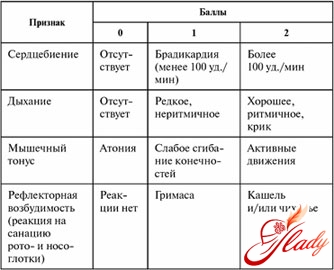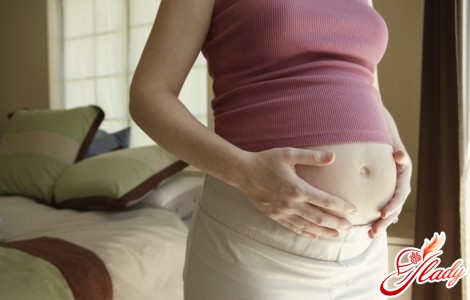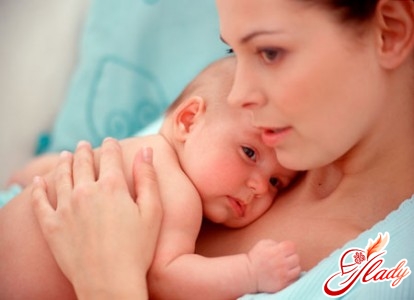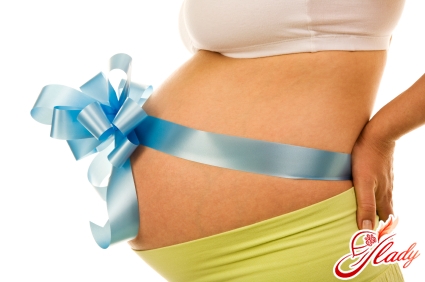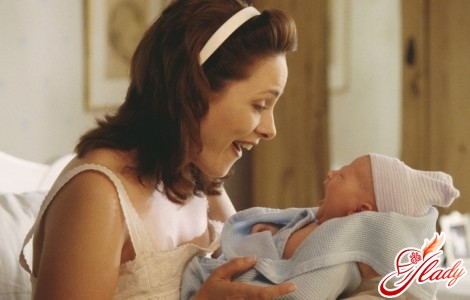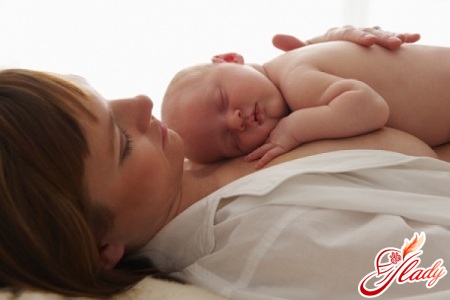 The first weeks after the birth of a child are alwaysare not easy. The entire burden of responsibility for the baby falls primarily on the mother. And this in turn can cause a woman to feel anxious, inexplicably irritable, tearful and even aggressive. Emotional ups and downs can be caused by changes in hormonal levels, fatigue, lack of experience or mutual understanding with the child, insufficient support from loved ones. For some women in labor, these fluctuations are insignificant or disappear within a few weeks after the birth of the baby. In other cases, a feeling of inability to overcome difficulties and a constant feeling of concern may occur. The woman is overtaken by postpartum depression. Many underestimate this disease and its consequences. And in vain. A person's mental state is sometimes much more important than his physical state. Especially if a baby is growing in the family, absorbing the mother's mood like a sponge. Signs of the development of postpartum depression can be different. Here are the most serious:
The first weeks after the birth of a child are alwaysare not easy. The entire burden of responsibility for the baby falls primarily on the mother. And this in turn can cause a woman to feel anxious, inexplicably irritable, tearful and even aggressive. Emotional ups and downs can be caused by changes in hormonal levels, fatigue, lack of experience or mutual understanding with the child, insufficient support from loved ones. For some women in labor, these fluctuations are insignificant or disappear within a few weeks after the birth of the baby. In other cases, a feeling of inability to overcome difficulties and a constant feeling of concern may occur. The woman is overtaken by postpartum depression. Many underestimate this disease and its consequences. And in vain. A person's mental state is sometimes much more important than his physical state. Especially if a baby is growing in the family, absorbing the mother's mood like a sponge. Signs of the development of postpartum depression can be different. Here are the most serious:
- "Children's melancholy" - usually manifests itself in the first weeks after childbirth. Most often it is short-lived. This type of postpartum depression is associated with a feeling of a complete change in the world around itself
- Excessive talkableness, anxiety or tearfulness
- Sharp changes in appetite. The usual sign of postpartum depression is loss of appetite
- Insomnia
Even if you get enough rest (and this is foryoung mothers - a huge rarity) you experience the above-mentioned feelings, you need to seek support from a psychologist on postpartum emotions. Many women are ashamed of their inexplicable emotions, hide them. Of course! After all, we were not taught to take care of our nerves before. In our country, it was not accepted to suffer from depression and go to psychotherapists. During the Soviet Union, all women were happy. Without exception. Because that was what they were told. And tears, nervous breakdowns and postpartum depression are all a whim. So the women in labor suffered in silence. And raised their daughters in ignorance that it turns out that crying is possible. And suffering from depression. And most importantly - to be treated for it.
Postpartum depression: the crux of the problem
Meanwhile, the occurrence of postpartum depressionscientifically proven and quite explainable. With the birth of a baby, a sharp hormonal restructuring occurs in the woman's body within 24 hours. The level of prostatitis and estrogens drops to the normal level before pregnancy. The adrenal glands and thyroid gland secrete less adrenaline and noradrenaline. Sensitivity to external and internal stimuli increases, fear and depression, apathy and inertia arise. In order for depression not to drag on, the relatives of the woman in labor should help her cope with the seemingly unreasonable changes in mood. Postpartum depression is not always noticeable to others, it can be perceived as indifference or whims of an inexperienced mother. At this moment, the support of the child's father is especially valuable, his willingness to share the care and anxiety for the child, the desire to fight for the happiness of the family, the ability to understand women's uncertainty and anxiety. In many ways, this is a test of the strength of family relationships: they can become closer or, conversely, formal and distant. Often, for a young mother, it is enough to say that she is still loved. As for those around her, they should remember that such a mood does not bring pleasure to the woman herself. She suffers much more than others, since a feeling of guilt is added to the psychosis. Everything is aggravated by the fact that the young mother is not able to fight her problem on her own. Therefore, there is no need to appeal to her reason and willpower, but it is better to try to understand a loved one and share his worries. But let's return to women in labor. Their nervous state can be further aggravated by lack of sleep, constant care for the child and the fatigue that has fallen on them. Therefore, the more help the young mother receives, the better. This is especially important if the woman has her first child. During this period, the girl is full of doubts and is not entirely confident in herself. Those women who have previously suffered from depression are most susceptible to emotional complications in the postpartum period.
Postpartum depression with the eyes of a baby
One of the reasons for the crisis may be the feelingloss, separation, because during childbirth the symbiotic unity of mother and child is destroyed, which is why they both suffer. For a child, birth is the first stress, he experiences horror from bright light, loud voices, sharp sounds, abdominal pain due to hunger and an overcrowded intestine. The stronger the attachment of the mother to the baby, the more acutely she feels his needs and empathizes with his condition. In addition, after childbirth, a woman does not always have the opportunity to constantly communicate with her child. It has been noted that women who are separated from their children in the first days after childbirth are more susceptible to postpartum depression. And if you are one of these women in labor, do not rush to beg the nannies to give you the child. It is important for you now to find the charm in a new, separate existence with your child. That is, to learn to love the baby, but not belong to him completely. Take care of him, but not make him your property. You still have to fight for his happiness for the rest of your life. So for now, just relax and unwind.
Maternity is the gift of nature
With the birth of a child, especially the first, you are inполной мере сможете осознать, что закончился беззаботный период вашей жизни с ее привычками, личной свободой, какими-то профессиональными планами. Вам может показаться, что теперь все ваше время принадлежит только ребенку, и у вас нет никаких прав на собственную жизнь, и что это теперь уже никогда не закончится. Возникает раздражительность, подавленность, недовольство собой. Такое состояние матери не самым лучшим образом отражается на ребенке. Когда к малышу прикасается несчастная мама с тревожным выражением лица и слезами в голосе, ребенок тоже становится нервным. Депрессия препятствует взаимопониманию мамы и малыша. Потерпите немного. Уже через несколько недель после рождения ваш ребенок будет улыбаться и узнавать вас, а вы забудете все свои честолюбивые планы на жизнь и с головой окунетесь в радость материнства. К тому же принятие материнства совсем не обязательно должно происходить в момент рождения ребенка. Это ощущение складывается постепенно на протяжении всей жизни, незаметно присутствуя и вспыхивая в особые моменты. Необходимо время, чтобы осознать, что теперь вы – мать. Материнство – это переломный момент в жизни женщины. Он такой же естественный, как и кризис подросткового возраста. Разрушаются старые представления о себе и выстраиваются новые. Переходный период матери начинается с желания женщины иметь ребенка, продолжается во время беременности и длится первый год жизни ребенка. В это время у роженицы формируется ответственность за себя и ребенка, меняется представление о женственности и сексуальности, появляется более глубокая оценка самой себя. Но, переживая кризисное время, женщина становится более уязвимой и хрупкой и поэтому требует более бережного отношения со стороны окружающих. Часто в проявлении у женщины материнского инстинкта ей помогает ее малыш. Именно ребенок делает женщину матерью. Они развиваются навстречу друг другу. Младенец приспосабливается к неловкостям мамы, к особенностям ее голоса, движений, а женщина учится делать все правильно, понимать потребности ребенка. Чтобы между мамой и ребенком возникла настоящая любовь, недостаточно грудного молока или игр. Уникальные отношения начинаются с осознания женщиной того, что в ней есть что-то от ребенка, а в нем есть что-то от нее. Опираясь друг на друга, мама и малыш будут счастливы: он будет расти, чувствуя себя любимым и защищенным, а она будет развивать свою любовь. При синдроме «бэби-блюз» для женщины бывает достаточно любого резкого слова, чтобы вызвать слезы. Но слезы — это не единственная реакция в этом случае. Некоторые женщины в моменты слабости начинают вести себя агрессивно. И если вы – одна из таких рожениц, то поймите, что бороться нужно не с окружающими, а с послеродовой депрессией. Находясь в больнице, вы можете обсудить свои проблемы с акушеркой. Это даже более правильный выбор, чем обращение к родственникам, поскольку ваши близкие подчас сами являются источником проблем, а акушерки хорошо знакомы с типичными заботами матерей в послеродовой период. Не стесняйтесь проконсультироваться и у психолога, вас никто не посчитает ненормальной. Если вы не разберетесь с тем, что вас тревожит, сейчас, то впоследствии это сделать будет гораздо труднее. 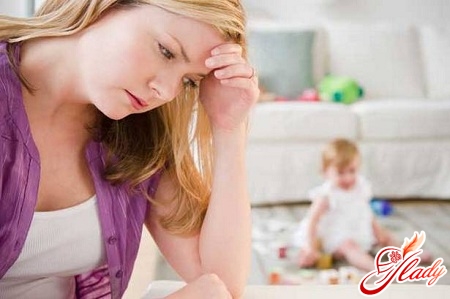
Depletion and Depression
We have already written that the recovery periodAfter childbirth lasts on average 6-8 weeks. But this time is not enough to fully restore your physical fitness and working capacity. On the contrary, such an attitude can lead to a completely opposite result and put you out of action for a long time, which will harm not only you, but also your child. You must remember that your main task is to feed the child. After childbirth, from the 4th to the 6th week inclusive, the child's appetite increases. Accordingly, the mother's milk production increases. All this leads to tense nights without sleep, chronic lack of sleep and fatigue. In addition, some babies cry incessantly - both day and night, and this can bring the mother to a nervous breakdown. Often, not finding the reasons for such crying, the mother begins to blame herself for everything. Another problem that you may encounter after the birth of a child is the cooling of your friends towards you, unless one of them has had a child themselves. The opposite situation is overly intrusive attention from relatives. At first, it may be necessary to limit the circle of visitors so that they do not tire you out once again. After all, communication will require quite a lot of your energy and take a lot of time. If, some time after the birth of the child, you feel headaches, gastrointestinal disorders arise, you are constantly cold, then this is evidence of postnatal exhaustion. Most often, it occurs in the second or third month after the birth of the child. If, in addition to all this, emotional experiences, uncertainty that you are a good mother, then you can easily fall into a state of postpartum depression. The causes of depression are most often overexertion, in the fact that all the worries about the house and the child fall on the shoulders of the woman. Therefore, in no case neglect the help of your husband, grandparents, girlfriends. Your loved ones and especially the child do not need a heroine, but a healthy mother. And sufficient sleep is the main factor ensuring normal breastfeeding. Try to set specific hours for rest, for example in the afternoon. Even if you don’t want to sleep, just relax, close your eyes and don’t communicate with anyone during this time. This will allow your body to recuperate.
Postpartum psychosis
This is the most severe form of postpartum depression.With postpartum psychosis, women lose contact with reality and lose the ability to orient themselves spatially. They hear inner voices and feel a desire to fight the outside world. The onset of postpartum psychosis is indicated by the appearance of insomnia, fear, clouding of consciousness, hallucinations, persecution mania, alcohol or drug addiction. There may be a desire to do something to oneself or the child. Causes of psychosis: intense hormonal changes after childbirth, emotional distress, hereditary predisposition to mental disorders, problems in family relationships. Postpartum psychosis is a consequence of physical, hormonal and mental overload. People suffering from such depression require psychiatric help. Most postpartum psychoses occur from the 7th to the 21st day after childbirth. And do not forget that the sooner treatment is started, the greater the chances for a speedy recovery. Finally, I would like to wish all women to be attentive not only to their families, but also to their own health. Believe that your children need you healthy and happy. Therefore, if you feel that postpartum depression has overwhelmed you, do not postpone treatment. We recommend reading:




